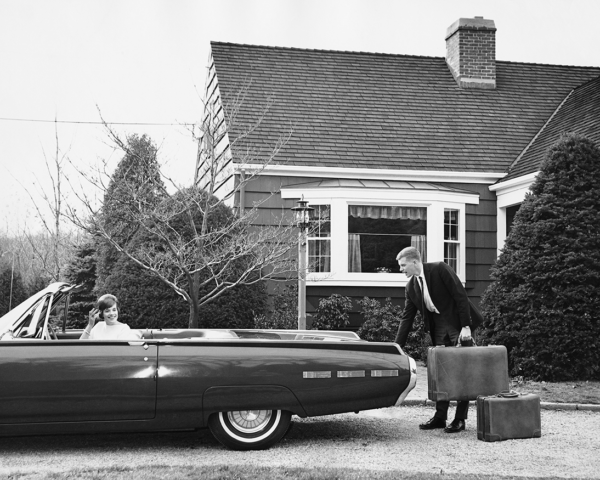
Retired Couple Chopped Down $40,000 Debt
While living in New York City, Clifton Seale and Charles Gilmore piled up an enormous amount of credit card debt for basic expenses and frequent dinners out.
After retiring – Seale was a librarian and Gilmore a clergyman – the couple were notified of a $200 rent increase on their Queens apartment. With so much debt on the books, they realized they could no longer afford New York City, and after a few visits to see friends near the Delaware seashore, they moved there.
“I like to say I flunked retirement because I found out neither of us could afford to live on the pension and Social Security,” Gilmore said.
Although Delaware was a less expensive place to live, they didn’t turn their finances around until they found the non-profit Stand by Me 50+, which offers free financial coaches to Delaware residents over age 50.
The couple, who have been together 35 years and married for 8 years, have a decent income by rural Delaware’s standards, if not New York’s. Their combined income is about $70,000 per year. They were able to buy a $185,000 three-bedroom house in Lincoln, Delaware, after a friend helped with the down payment. Their $1,150 mortgage isn’t much more than the rent on their one-bedroom apartment in Queens.
Credit cards were Seale and Gilmore’s big issue. They owed about $40,000, including moving expenses and some new furniture purchased in Delaware. Both of them had retired at a fairly young age – 62 – but felt they had no choice but to go back to work. Gilmore found a job at a local operation for a national hospice organization and, last September, landed a part-time position as a Presbyterian pastor. Seale has worked at a non-profit that helps seniors who want to age in their homes.
The extra income helped, but the debt was still going up. “We weren’t paying off as much [debt] as we were spending,” Seale said. “No matter what I did, everything was still falling down around my shoulders.”
They just needed to get rid of the debt. So Nanci Glindmyer, their personal coach at Stand by Me 50+, recommended a reliable debt consolidation company, which took over and paid the couple’s credit card bills in return for a small fee. At first, they paid the company about $1,000 per month, including the $50 monthly administrative fee. But the payments dropped over time as the debt shrank. Clifton said he felt relieved every time they were notified that they had paid off another card. It took four years to eliminate the debt.
Stand by Me 50+, founded in 2013, has assisted more than 2,300 clients – most are retirees – with all kinds of financial issues. They help clients apply for government aid, pay medical bills, whittle down debt, or make decisions about retiring.
To prevent problems in the future, Glindmyer asked Seale and Gilmore to take a hard look at their expenses. She said they’d been spending too much on restaurants and vacations. Going over their household budget with Glindmyer “gave me a lot more clarity about what our financial situation was, and I stopped feeling so overwhelmed,” Gilmore said.
When the couple were finally debt free, about a year ago, they splurged on a nice dinner in Rehoboth Beach, Delaware. “We hadn’t gone out very much,” he said, “so it was nice to celebrate.”
Being free of onerous credit card debt is definitely something to celebrate.
Last week, Squared Away profiled Peggy Grasty, a low-income retiree who also got help from a financial coach at Stand by Me 50+. She is now receiving food stamps and some assistance paying her medical bills.
Squared Away writer Kim Blanton invites you to follow us on Twitter @SquaredAwayBC. To stay current on our blog, please join our free email list. You’ll receive just one email each week – with links to the two new posts for that week – when you sign up here. This blog is supported by the Center for Retirement Research at Boston College.
Comments are closed.







Great story!! That is tough to do.
When I graduated from college in 1982 with a bachelor’s degree in computer science, my first job provided me more money than I ever had. And I proceeded to go on a credit card spending spree – Diners Club, Carte Blanche, American Express, and more. One day, I found myself in thousands of dollars in debt. So, I stopped the crazy spending cold turkey.
For well over a year I stopped all unnecessary spending and paid off all my debt – every day I would go to work and then back home at the end of the day (that time of my life was really a drag). I still spent on groceries, gasoline for my car, and other necessities, but the frivolous spending ended right then.
Following that period of clarity, I started saving and investing and have never looked back. Today, I’m 12 years into retirement (my wife and I both retired early at age 55y/o) and living quite comfortably – all because I saw the error of my ways and chose to take control of my destiny.
Great story Brian! Provides some valuable insight into your financial security now. Appreciate the comment!
I am always amazed as to what the problems are that usually get folks into debt. Do you really need to go out to dinner all the time? Do you really need to take a vacation? So you really need the latest cell phone?
It’s common sense to figure out need, want, have to have!
But the older I get, 63, I hear stories and just shake my head. We “trained“ our 3 boys to be frugal and I am very proud their debt is minimal.
I’m shocked the couple was willing to go back to work. I’ve worked with several boomers who decided to “roll the dice” and hope their savings didn’t run out.
For some retirees that worked. But most of the time it was painful to watch.
I’ve seen several people get into massive credit card debt merely because they’re spenders with low impulse control. They see something they want, whether it’s an object, a dinner out, or vacation, and whip out the credit card.
One of them pays only the minimum payment on all his card(s), and then, when the debts become too crushing, refinances his house (four or five times now) and pulls cash out to pay off his credit card bills. He now owes three times the balance of his original mortgage, and has run the cards up again.
What’s made his action possible is easy refinancing along with skyrocketing house prices. I can’t imagine what will happen when the merry-go-round stops.